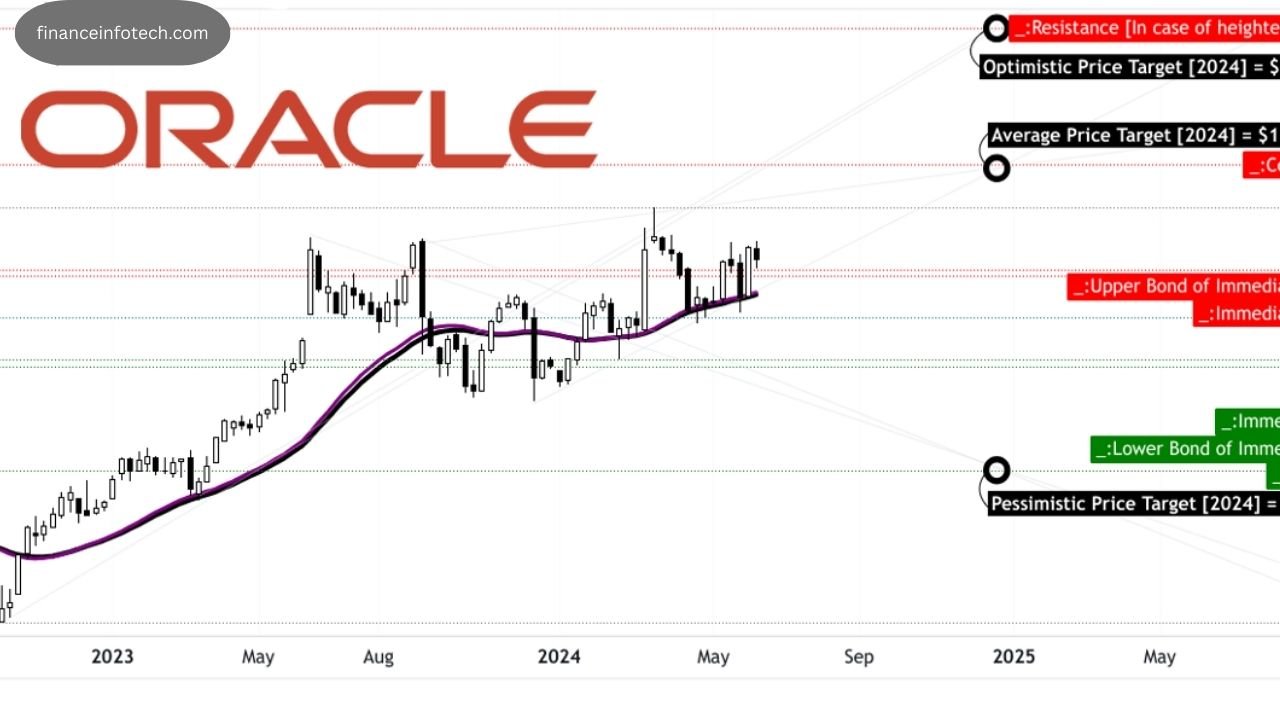Table of Contents

A deep dive into the tech giant’s market performance
Oracle Corporation is one of the pillars that support the modern landscape of technology. Oracle’s database software has been the backbone of countless global businesses for decades. The company is currently undergoing a major change, refocusing its attention on the world of cloud computing, which is highly competitive. Oracle’s stock (NYSE ORCL) is more attractive than ever because of this evolution.
Oracle has expanded its portfolio over the years through strategic acquisitions. The most notable were PeopleSoft, Siebel and Sun Microsystems. Oracle’s portfolio was expanded by these acquisitions to include enterprise resource management (ERP), Customer Relationship Management (CRM), as well as hardware. Oracle’s stock has grown into a large enterprise software company that offers a wide range of products and services for companies of all sizes.
Oracle stocks are traded on the New York Stock
Oracle stocks are traded on the New York Stock Exchange using the ticker ORCL. It has been a long-standing blue-chip stock in the technology sector as it is a mature, profitable company. Investors seeking growth and income are attracted to the company’s share buyback program and dividend history. ORCL’s narrative has changed in recent years from its legacy databases to its ambitious push towards cloud infrastructure and applications.
The decade following was one of gradual recovery and consolidation. Oracle concentrated on expanding its enterprise-software empire through acquisitions. The company generated massive profits and cash flow thanks to this strategy led by co-founder Larry Ellison. Stocks gradually gained investor confidence and delivered solid returns, if they weren’t spectacular. It became a profitable, stable tech company rather than a disruptive disruptor.
Cloud computing
Cloud computing was a major challenge in the 2010s. Oracle’s stock was seen as being behind the curve when companies started migrating away from on-premises data centers and towards cloud services provided by Amazon Web Services, Microsoft Azure and others. The stock price was impacted by this perception for many years as investors questioned Oracle’s ability to change its business model.
Oracle started to show tangible progress with its cloud migration in the late 2010s. This continued into the 2020s.

Oracle Stock Price: Key Influencers
Oracle’s most important metric today is Cloud Revenue Growth. Investors are closely watching the growth rate of Oracle Cloud Infrastructure (OCI) and its cloud apps (Fusion ERP, NetSuite ERP). The segment’s rapid, strong growth indicates a successful transition away from legacy on-premise businesses. A decline in cloud revenues may also cause a negative reaction on the market. A slow, managed decline is expected, but a faster-than-anticipated drop could offset gains from the cloud business and negatively impact overall earnings.
Oracle’s aggressive share-purchase program and long-standing dividend policy have been ways for the company return capital to shareholders. ORCL has become a favorite investment among income-oriented investors due to these actions. Investor sentiment may be affected by changes in the dividend policy of a company or the scale of its buyback program.
Recent Developments in the Field of Education and Their Impact
Oracle’s stock has undergone a transformation in the last two years, as several key developments have reshaped its market perception.The purchase of Cerner Corporation was the most important event. Cerner is a leading digital information system provider for hospitals and healthcare providers.
This massive deal, which was completed in 2022 as a strategic bet for the transition of the healthcare industry to the cloud, was concluded. The goal of the deal is to migrate Cerner’s existing systems to OCI and create a powerful cloud solution that caters to specific industries. The integration has been a challenge and initially affected Oracle’s margins. However, if it is successful in the long run, Oracle could have a new, massive market. Stocks have reacted to the announcement with a mixture of optimism and caution about execution risks.
Oracle’s earnings
Oracle’s earnings reports are still pivotal. Recent reports show that OCI is growing faster than expected and cloud applications are in high demand. This metric also shows future contracted revenue. It is a good indicator of future business. These results confirm that Oracle’s cloud-based strategy is gaining traction. This has led to an upward revision of the stock price target. Future Outlook and Expert Opinions
Oracle’s future depends on the success of cloud computing and AI initiatives.
Oracle’s potential is viewed with cautious optimism by many analysts, but opinions vary on its size. According to Oracle Bulls, Oracle is focused on strategic goals. OCI, they claim, is a high-performance and cost-effective alternative to the larger cloud providers. This is particularly true for AI workloads and enterprise workloads.
Oracle’s relationships with enterprise customers
Oracle’s relationships with enterprise customers give it an edge when selling cloud services to loyal and existing customers. The growth of AWS and Microsoft Azure is so massive, they argue, that Oracle will find it difficult to establish a long-term, meaningful position. Others are concerned with the execution risk as well as the debt incurred by the Cerner purchase.
Oracle’s stock progress is generally acknowledged by experts. Oracle’s cloud transition has become a major storyline, and the question is no longer “if” it can be done but “how successful will this transition be”. Many have re-evaluated the company’s technological capabilities after its ability to secure major AI-related contracts. The next few year will prove whether or not the current momentum will continue and whether or not the massive healthcare bet will pay off.

FAQs
1- Is Oracle an attractive stock to invest in for the long term?
Oracle is a great option for those who are interested in investing for the long-term, especially if they believe in Oracle’s cloud and AI strategies. The established enterprise business offers a solid foundation while the cloud segment has growth potential. It is a blue-chip dividend stock that appeals to investors who are looking for a mix of income and growth. Like any stock, there are risks associated with it, mostly related to the competition and execution.
2- What is Oracle’s stock main business?
Oracle’s main business in the past was enterprise software on premise and database software. The company’s focus is on two areas today: Cloud Services, License Support (which includes support for legacy products and cloud offerings) and Cloud License & On-Premise License. Growing the cloud services segment is a strategic priority.
3- Who are Oracle’s stock main competitors?
Oracle’s main rivals in the cloud infrastructure market are Amazon (AWS), Microsoft Azure (Azure) and Google GCP. Oracle’s main competitors in the enterprise software-and-applications (SaaS), market are SAP, Salesforce and Workday. It is in competition with many companies, thanks to its diverse product range.
4- Does Oracle stock pay dividends?
Oracle pays a quarterly dividend. Oracle occasionally increases its dividend payout. This makes it a good option for investors who are looking to earn income.
5- How will the Cerner acquisition impact Oracle?
Oracle’s acquisition of Cerner is a transformational move, positioning it as a major player within the healthcare technology industry. In the short term, Oracle will be faced with significant debt as well as integrating a new massive business. The long-term objective is to migrate Cerner clients to OCI, and to build a suite of next-generation cloud-based health tools. This could be a huge new revenue stream for Oracle.
Conclusion
Oracle Corporation is at a critical inflection point. Oracle Corporation is a company at a crucial inflection point. After dominating the market for on-premise databases for decades, the company is now fully committed to reinventing themselves as a formidable player in the cloud and AI age. It has been a challenging journey, and the market was skeptical for a very long time. Recent performance, driven primarily by cloud growth and strategic victories in the AI sector, has fundamentally changed the narrative around the stock.

Leave a Reply